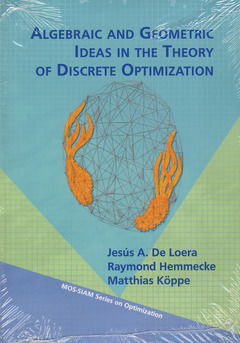Description
Algebraic and Geometric Ideas in the Theory of Discrete Optimization
MPS-SIAM Series on Optimization Series
Authors: De Loera Jesús, Hemmecke Raymond, Köppe Matthias
Language: English
Subjects for Algebraic and Geometric Ideas in the Theory of Discrete...:
Publication date: 02-2013
333 p. · 17.8x25.4 cm · Paperback
Withdrawn from sale
333 p. · 17.8x25.4 cm · Paperback
Withdrawn from sale
Description
/li>Contents
/li>Biography
/li>
In recent years, many new techniques have emerged in the mathematical theory of discrete optimization that have proven to be effective in solving a number of hard problems. This book presents these recent advances, particularly those that arise from algebraic geometry, commutative algebra, convex and discrete geometry, generating functions, and other tools normally considered outside of the standard curriculum in optimization. These new techniques, all of which are presented with minimal prerequisites, provide a transition from linear to nonlinear discrete optimization. This book can be used as a textbook for advanced undergraduates or first-year graduate students in mathematics, computer science or operations research. It is also appropriate for mathematicians, engineers, and scientists engaged in computation who wish to gain a deeper understanding of how and why algorithms work.
List of figures; List of tables; List of algorithms; Preface; Part I. Established Tools of Discrete Optimization: 1. Tools from linear and convex optimization; 2. Tools from the geometry of numbers and integer optimization; Part II. Graver Basis Methods: 3. Graver bases; 4. Graver bases for block-structured integer programs; Part III. Generating Function Methods: 5. Introduction to generating functions; 6. Decompositions of indicator functions of polyhedral; 7. Barvinok's short rational generating functions; 8. Global mixed-integer polynomial optimization via the summation method; 9. Multicriteria integer linear optimization via Barvinok–Woods integer projection; Part IV. Gröbner Basis Methods: 10. Computations with polynomials; 11. Gröbner bases in integer programming; Part V. Nullstellensatz and Positivstellensatz Relaxations: 12. The Nullstellensatz in discrete optimization; 13. Positivity of polynomials and global optimization; 14. Epilogue; Bibliography; Index.
Jesús A. De Loera is a Professor of Mathematics and a member of the Graduate Groups in Computer Science and Applied Mathematics at University of California, Davis. His research has been recognised by an Alexander von Humboldt Fellowship, the UC Davis Chancellor Fellow award, and the 2010 INFORMS Computing Society Prize. He is an Associate Editor of SIAM Journal of Discrete Mathematics and Discrete Optimization.
Raymond Hemmecke is a Professor of Combinatorial Optimization at Technische Universität München. His research interests include algebraic statistics, computer algebra and bioinformatics.
Matthias Köppe is a Professor of mathematics and a member of the Graduate Groups in Computer Science and Applied Mathematics at University of California, Davis. He is an associate editor of Mathematical Programming, Series A and Asia-Pacific Journal of Operational Research.
Raymond Hemmecke is a Professor of Combinatorial Optimization at Technische Universität München. His research interests include algebraic statistics, computer algebra and bioinformatics.
Matthias Köppe is a Professor of mathematics and a member of the Graduate Groups in Computer Science and Applied Mathematics at University of California, Davis. He is an associate editor of Mathematical Programming, Series A and Asia-Pacific Journal of Operational Research.
© 2024 LAVOISIER S.A.S.




